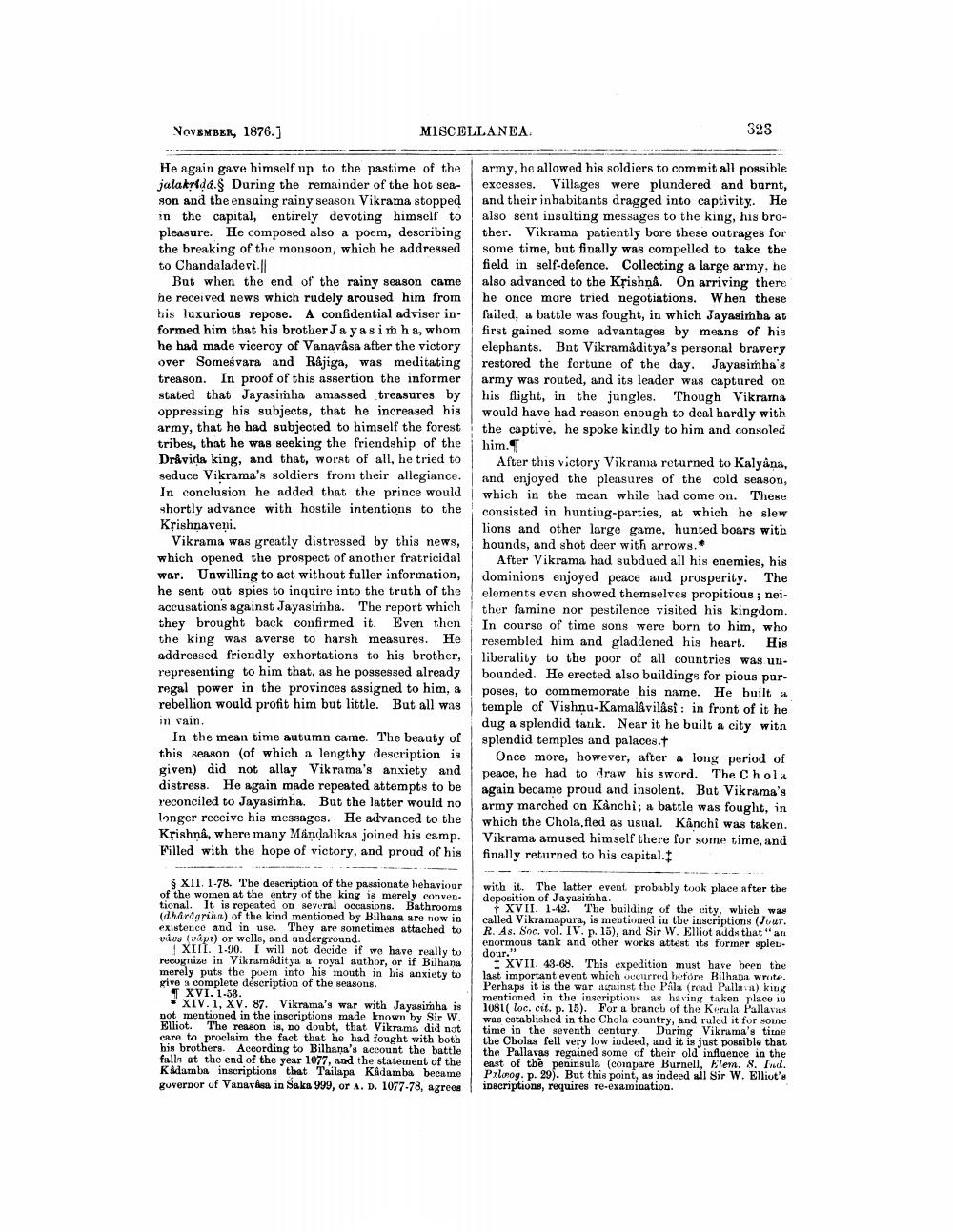________________
MISCELLANEA.
NOVEMBER, 1876.]
He again gave himself up to the pastime of the jalakriḍa.§ During the remainder of the hot season and the ensuing rainy season Vikrama stopped in the capital, entirely devoting himself to pleasure. He composed also a poem, describing the breaking of the monsoon, which he addressed to Chandaladevi.||
But when the end of the rainy season came he received news which rudely aroused him from his luxurious repose. A confidential adviser informed him that his brother Ja yasimha, whom he had made viceroy of Vanavâsa after the victory over Someśvara and Râjiga, was meditating treason. In proof of this assertion the informer stated that Jayasimha amassed treasures by oppressing his subjects, that he increased his army, that he had subjected to himself the forest tribes, that he was seeking the friendship of the Dravida king, and that, worst of all, he tried to seduce Vikrama's soldiers from their allegiance. In conclusion he added that the prince would shortly advance with hostile intentions to the Krishnaveni.
Vikrama was greatly distressed by this news, which opened the prospect of another fratricidal war. Unwilling to act without fuller information, he sent out spies to inquire into the truth of the accusations against Jayasimha. The report which they brought back confirmed it. Even then the king was averse to harsh measures. He addressed friendly exhortations to his brother, representing to him that, as he possessed already regal power in the provinces assigned to him, a rebellion would profit him but little. But all was in vain.
In the mean time autumn came. The beauty of this season (of which a lengthy description is given) did not allay Vikrama's anxiety and distress. He again made repeated attempts to be reconciled to Jayasimha. But the latter would no longer receive his messages. He advanced to the Krishna, where many Mandalikas joined his camp. Filled with the hope of victory, and proud of his
§ XII. 1-78. The description of the passionate behaviour of the women at the entry of the king is merely conventional. It is repeated on several occasions. Bathrooms (dharagriha) of the kind mentioned by Bilhana are now in existence and in use. They are sometimes attached to vius (vape) or wells, and underground.
XIII. 1-90. I will not decide if we have really to recognize in Vikramaditya a royal author, or if Bilhana merely puts the poem into his mouth in his anxiety to give a complete description of the seasons.
XVI. 1-53.
XIV. 1, XV. 87. Vikrama's war with Jayasimha is not mentioned in the inscriptions made known by Sir W. Elliot. The reason is, no doubt, that Vikrama did not care to proclaim the fact that he had fought with both his brothers. According to Bilhana's account the battle falls at the end of the year 1077, and the statement of the Kadamba inscriptions that Tailapa Kâdamba became governor of Vanavâsa in Saka 999, or A. D. 1077-78, agrees
328
army, he allowed his soldiers to commit all possible excesses. Villages were plundered and burnt, and their inhabitants dragged into captivity. He also sent insulting messages to the king, his brother. Vikrama patiently bore these outrages for some time, but finally was compelled to take the field in self-defence. Collecting a large army, he also advanced to the Krishna. On arriving there he once more tried negotiations. When these failed, a battle was fought, in which Jayasimha at first gained some advantages by means of his elephants. But Vikramaditya's personal bravery restored the fortune of the day. Jayasimha's army was routed, and its leader was captured on his flight, in the jungles. Though Vikrama would have had reason enough to deal hardly with the captive, he spoke kindly to him and consoled him.
After this victory Vikrama returned to Kalyana, and enjoyed the pleasures of the cold season, which in the mean while had come on. These consisted in hunting-parties, at which he slew lions and other large game, hunted boars with hounds, and shot deer with arrows."
After Vikrama had subdued all his enemies, his dominions enjoyed peace and prosperity. The elements even showed themselves propitious; neither famine nor pestilence visited his kingdom. In course of time sons were born to him, who resembled him and gladdened his heart. His liberality to the poor of all countries was unbounded. He erected also buildings for pious purposes, to commemorate his name. He built a temple of Vishnu-Kamalâvilâsi: in front of it he dug a splendid tank. Near it he built a city with splendid temples and palaces.+
Once more, however, after a long period of peace, he had to draw his sword. The Chola again became proud and insolent. But Vikrama's army marched on Kanchi; a battle was fought, in which the Chola, fled as usual. Kânchi was taken. Vikrama amused himself there for some time, and finally returned to his capital.
with it. The latter event probably took place after the deposition of Jayasimha.
XVII. 1-42. The building of the city, which was called Vikramapura, is mentioned in the inscriptions (Jour. R. As. Soc. vol. IV. p. 15), and Sir W. Elliot adds that "an enormous tank and other works attest its former spleudour."
I XVII. 43-68. This expedition must have been the last important event which occurred before Bilhana wrote. Perhaps it is the war against the Pala (read Pallava) king mentioned in the inscriptions as having taken place in 1081( loc. cit. p. 15). For a branch of the Kerala Pallavas was established in the Chola country, and ruled it for some time in the seventh century. During Vikrama's time the Cholas fell very low indeed, and it is just possible that the Pallavas regained some of their old influence in the east of the peninsula (compare Burnell, Elem. 8. Ind. Poloog. p. 29). But this point, as indeed all Sir W. Elliot's inscriptions, requires re-examination.




